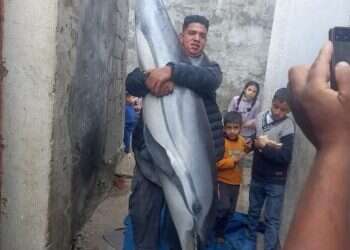A final decision by the National Infrastructure Committee, which will likely be made before the end of the summer, could determine the future of the extraordinary Ayalon Cave in the coastal region and the fate of the rare lifeforms inhabiting it.
Follow Israel Hayom on Facebook and Twitter
The cave, located in the Nesher-Ramla quarry, is covered by a thick layer of chalk that was impermeable to water. Until its discovery in 2006, it was completely sealed off, meaning that its ecosystem had been preserved for possibly millions of years. Eight until-then unknown animals – four seawater and freshwater crustaceans and four terrestrial species – were discovered in the cave, along with unique bacteria.

Scientists from the Israel Cave Research Center were surprised to discover the cave, which is the third-longest in the country at nearly 2,700 yards while running some 100 yards deep, and even more astonished to discover the delicate ecosystem and the extremely rare lifeforms it supports – which are completely non-dependent on the outside world.
Experts have already described the cave as a "global sensation" and exploring it as "akin to visiting outer space."

However, due to future infrastructure projects including laying railroad tracks along the Ayalon River, the need has arisen to divert the river's original water flow. The cave, meanwhile, is situated in the path of the alternative river route. Consequently, the fear is that water could flood the cave and disrupt the delicate chemical balance inside that allows the organisms there to exist, potentially killing them.
Boaz Langford and Prof. Amos Frumkin of the Israel Cave Research Center at Hebrew University in Jerusalem, describe the current phase as the final stretch.

"We are after the stage of public opposition, and now what the National Infrastructure Committee decides after the planned meetings in July will determine the fate of this rare national resource," said Frumkin, who heads the Israel Cave Research Center.
"The problem we are currently facing is the water flow into the cave. The makeup and amount of water that would arrive from the outside are different from that which allows the life in the cave. The situation today is that water in the Ayalon River flows to the [Mediterranean] sea. According to the new plan, the water will be diverted into the quarry and from there will seep into the cave," explained Frumkin.
According to Langford: "We all want efficient and comfortable transportation, but the issue of diverting the water flow to the Ayalon Cave needs to be resolved differently so as not to harm it. Several such solutions have been proposed to the committee by experts."

The lifeforms that will be destroyed if the current plan is implemented "do not exist anywhere else in the world," said Frumkin. "The mission of preserving an ecosystem that simply has no equivalent falls on us as a country."
"We call on everyone involved in this matter," said Langford, "don't make a mistake that can't be fixed by eradicating lifeforms that survived for millions of years, until we reached them."
The Environmental Protection Ministry said in response: "It was brought to our attention recently that the [construction] plan could harm the Ayalon Cave, and we are working to examine how to prevent as much damage as possible to this unique cave. We are studying the matter and examining the various alternatives."
The Interior Ministry and the National Infrastructure Committee said in a statement that "the plan is in the phase of hearing the public's appeals and reservations. Any objection that is submitted will be examined in a professional manner."
Subscribe to Israel Hayom's daily newsletter and never miss our top stories!




